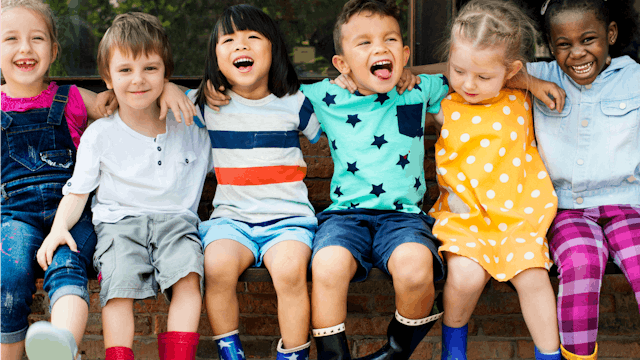Now Is The Time For Us To Raise Kids Who Are Includers

Kids can be mean. This isn’t fake news.
Since the beginning of time, wedgies have been given, “nerds” have been thrown into dumpsters, and playground tears have been shed over pint-sized little buttholes. Who knows why, but humans like to hurt each other. They gossip, fight, and bully, and I’m sad to say, it doesn’t get much better when we become adults. In fact, some of the biggest jerks at my local playground are the ones sipping lattes in their yoga pants.
Of course, none of us want to raise jerks. Nobody brings a tiny human into the world in hopes that they’ll turn into a self-centered little turd. No, as parents, we do our best. We try to raise kids by the golden rule. We teach them not to gossip and fight, and that their actions affect others.
But what do we teach them about passive exclusion? The kind of hurt inflicted on others by inaction? Perhaps you’ve been on the receiving end of those playground mean girls. The ones who turn their backs to the new mom in town? If you’ve been there, you know: Excluders can hurt you just as bad as those dumpster-stuffing bullies.
And that’s why parents must do better than just not raising bullies. We need to take our efforts one step further: We need to raise the includers.
Look at present society: Bullies no longer hide in shadows; they wave their flags of hatred out in the open. From playgrounds to college campuses, all the way to the freaking White House, there is a dire shortage of loving kindness in this country. And I don’t know about you, but I want my kids to buck this trend. But how do we fight back against the very human tendency to separate and exclude? How do we teach our children to be the includers that our world so desperately needs?
Well, for starters we can be includers.
1. Model inclusivity.
This is one of those times when “do as I say and not as I do” doesn’t work. If you mock other adults when your children are around, little eyes will be watching. When parents demonize racial, religious, or other personal differences inside the home, kids will model that behavior outside of the home. We must teach our children age-appropriate lessons on emerging issues in society. Acknowledge differences and talk about why they matter. Be the includer you wish to see in the world.
2. Encourage loving behavior every chance you get.
If you see your child being socially inclusive, tell them how proud you are. Be specific with your praises, and identify the emotions involved. “Son, it made me so proud that you included Tom in your game. I bet his heart feels happy! I am so proud when you include others.” By encouraging kindness and identifying its rewards (Tom’s happy heart!), you are teaching your child to consider other children’s emotions. This is the beginning of empathy, which leads to my next point…
3. Train empathy.
There will come a day when your child runs up to you, crying. You will frantically search for a boo-boo, only to discover that the hurt is in their tender little heart. All because some jerk kid on the playground refused to be an includer. Now, your first instinct might be to find that little brat and teach him a thing or two about justice. But that’s not the lesson to impart in this moment. How you respond in the face of cruelty is key to raising an includer. When your child is sad because they feel left out, use that opportunity to instill an important lesson. Comfort them. Then, when the moment of sadness has passed, ask: “Do you remember how sad you felt when Emily didn’t let you play? That’s why we choose to include everybody. We don’t want to make others feel sad.” Empathy is emotional intelligence that requires practice. It doesn’t come natural for children to put themselves in someone else’s shoes. Teach them how.
4. Speak out against injustice.
Sadly, we are living in a world where inclusivity is rare. Turn on the news for five minutes, and you will see the very real, very heartbreaking ramifications of adults who grew up to be excluders. The political climate of this world is hot, and our children are watching. If an entire group of people is being discriminated against and we stay silent, what have we taught our children about inclusivity? That doesn’t work, and it’s not an option.
The time for warriors is now. We have to push back against hate every day. We must be as ruthless with justice as we are with kindness. We must speak up for the marginalized. Be allies. Teach our kids that being an includer means living with open arms. Then show our kids that means for everybody.
This world is a messy place. There are no simple solutions to the troubles of present society, but there may be a solution for future generations: Buck the trend of exclusivity and hate. Let’s raise includers.
And maybe this world will change one little empathetic, inclusive, badass justice warrior at a time.